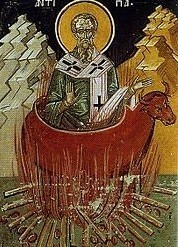Admonition: (2:10-11). No words of accusation are given to the congregation in Smyrna! They may not have enjoyed the approval of men, but they certainly received the praise of God. However, the Lord did give them solemn words of admonition as they faced increased suffering: “Don’t be afraid!” The Lord would give them strength to endure it. “In the world you have tribulation, but take courage; I have overcome the world.” God is Sovereign and controls all the circumstances of life. He will not permit Satan to torment the Smyrna Church for long. Jesus promised that they would have tribulation for only 10-days. Though some see the 10-days as symbolically representing 10-great periods of persecution under the Romans, but the interpretation is not clear. It appears that Satan would bring the persecution, although very severe, but would be very brief. God promises the “crown” for their genuine faith and perseverance, which definitely proves that their faith is very genuine.
“He who has ear, let him hear what the Spirit says to the churches”closes each of the seven letters. It stresses the vital significance of what God says in Scripture, and emphasizes believers’ responsibility to heed it. For all Christians who overcome the tribulations, persecutions may suffer first, physical death, but they will not experience the second death of hell (Rev. 20:14; 21:8).
The persecuted suffering, yet faithful church at Smyrna stands for all time as an example of those who “have heard the word in an honest and good heart, and hold it fast and bear fruit with perseverance (Lk.8:15). Because they loyally confessed Him before men, Jesus will confess them before the Father (matt.10:32)
III Pergamum: The worldly Church: (2:12-17):
Pergamum is the “the greatest city in Asia Minor.” Pergamumhad the first temple dedicated to Caesar and was a rapid promoter of the imperial cult. This is probably what is meant by “Satan’s seat” (2:13). The city also had a temple dedicated to Aesculapius, the god of healing, whose insignia was the entwined serpent on the staff. (This is still a medical symbol today). Satan, of course, is likewise symbolized as the serpent (2 Cor. 11:3; Rev.12:9; 20:2). Christian doctors are advised not to put such labels on their vehicles which are common in India. Pergamum like many of today’s churches, failed to follow the biblical warnings against worldliness. It had drifted into compromise and was in danger of becoming intertwined with the world.
The Lord Jesus Christ identifies as one who has the sharp two-edged sword which refers to the Word of God. “The word of God is living and active and sharper than any two edged sword”(Heb.4:12). The Apostle Paul also uses the metaphor of a sword to describe the Word (Eph.6:17). The description pictures Christ as judge and executioner. Describing His appearance at the second coming, John writes that “from His mouth comes a sharp sword, so that with it He may strike down the nations and He will rule them with a rod of iron; and He treads the wine press of the fierce wrath of God, the Almighty”(19:15). Disaster is looming on the compromising church for forsaking the God.
This Church is a reflection of the some of the early churches during (312-606) A.D.
History: The book of Acts does not record the founding of the church at Pergamum. According to Acts 16:7-8, Paul passed through Mysia (the region in which Pergamum was located) on his second missionary journey, but there is no record that the apostle either preached the gospel or founded a church there at that time. Most likely, the church at Pergamum was founded during Paul’s ministry in Ephesus, when the gospel spread from there throughout the province of Asia (Acts 19:10). Because they are surrounded by pagan culture, it was continually exposed to temptation, in addition to severe persecution when standing against emperor worship.
Pergamum was about 100-miles north of Ephesus, with Smyrna. It was not a port city located about 15-miles inland from the Aegean Sea. Pergamum today is Bergama a Turkish city. Pergamum had a huge library with 250,000 handwritten volumes was second only to that of Alexandria. Because of its library, Pergamum was an important centre of culture and learning.

Burning of Antipas
Many Christian traditions believe Saint Antipas to be the Antipas referred to in the Book of Revelation (Rev.2:13) as the “faithful martyr” of Pergamum, “where Satan dwells”. According to Christian tradition, John the Apostle ordained Antipas as bishop of Pergamum during the reign of the Roman emperor Domitian. The traditional account goes on to say Antipas was martyred in 92 AD by burning in a brazen bull-shaped altar used for casting out demons worshiped by the local population. There is a tradition of oil (manna of the saints) being secreted from the relics of Saint Antipas. On the calendars of Eastern Christianity, the feast day of Antipas is celebrated on 11th April everyyear.